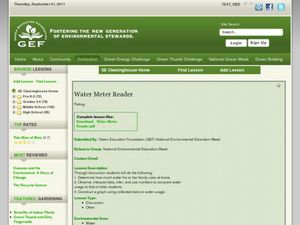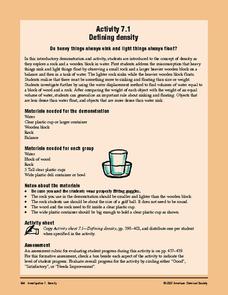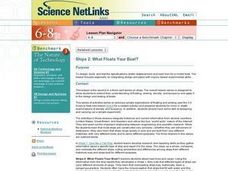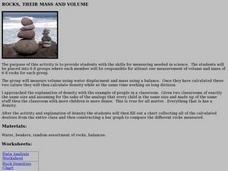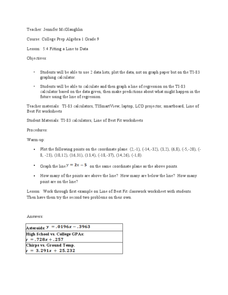Curated OER
Float Your Boat
Learners investigate buoyancy, displacement and density. In this flotation lesson students study the Archimedes' Principle, analyze data and draw conclusions.
Curated OER
Water Displacement
Students formulate a hypothesis using critical thinking skills. They use an orange to examine the displacement of water as the orange sinks or floats.
Curated OER
Made to Sail
Students use simple materials to make model sailboats which must stay upright and sail straight in a testing tank.
Curated OER
Water Meter Reader
Students examine a water bill from their household and examine it to find out how much water is used each month. They read their home water meters at the same time of the day for seven days and then construct a graph using their data.
Curated OER
Measuring Body Fat
In this body fat measurement worksheet, students will conduct an experiment to determine how the "under-water weighing" technique of measuring body fat works. Once the experiment is complete, students will complete 1 short answer question.
California Academy of Science
Global Climate Change and Sea Level Rise
Ice is nice, and its condition on the planet has a significant effect. Junior geoscientists experiment with ice melting in both water and on land to discover how each affect the rising sea level. This detailed lesson outline even...
American Chemical Society
Defining Density
Three simple activities kick off a unit investigation of density. Your physical scientists make observations on the volume and mass of wood, water, and rocks, and make comparisons. Though this is written for grades three through eight,...
Teach Engineering
Buoyant Boats
Eureka! Using the clay boats made in the previous lesson, learners investigate the idea of buoyancy and water displacement to finish the last installment of five in a Floaters and Sinkers unit. Their observations during the activity...
NOAA
Ocean Waves
Surf's up! What causes the constant motion of Earth's oceans? Scholars discover the origins and types of waves in part nine of a 13-installment series. The resource illustrates wave behavior, their destructive power, and current research...
Curated OER
Classifying Chemical Reactions
In this chemical reactions worksheet, students follow a flow chart to determine what type of reaction is occurring. Students then classify reactions and balance the equations. This worksheet has 2 short answer and 10 fill in the blank.
National Sailing Hall of Fame
How a Sailboat Works: Hull Speed and Buoyancy
How can you determine the maximum speed of a sailboat? A sailing presentation included with a straightforward lesson plan prompts learners to calculate the maximum speed of a sailboat with a displacement hull. The...
Curated OER
Ships 2: What Floats Your Boat?
Students design, build, and test the specifications (water displacement and load line) for a model boat. The lesson focuses especially on integrating design principles with inquiry-based experimental skills.
Curated OER
Unit VI: Worksheet 1 - Constant Force/Gravitational Force
Seven problems regarding gravitational pull are presented in this physics drill. Pupils solve for displacement, time, speed, and acceleration. Critical thinking and problem solving skills are both required to complete the assignment.
Curated OER
Target Earth
Space scientists use water displacement to determine the mass of a cubic centimeter mini meteorite, and then use it as a small-scale representative of an asteroid. They figure out the orbital velocity of an asteroid. Then they use a...
UNICEF
Refugees and IDPs Activities
Class members have an opportunity to consider issues faced by refugees and Internally Displaced Persons (IDPs) by participating in a series of activities that illustrate some of the challenges refugees experience.
Beyond Benign
Packed Up Properties
Determine physical properties of potential packaging materials. Continuing from previous lessons in the series, the resource asks groups to identify physical properties of the substances. They test for conductivity, solubility, water...
Curated OER
Come On Down!
Begin with an introduction to famous deep-sea submersibles. Learners work in groups to gather information on different vessels and then share with the class. Each group then uses water displacement to help calculate the density of...
Nature New Brunswick
Habitat for Endangered Wildlife and You
Compare and contrast your habitat with that of endangered plants and animals! Learners discuss what a habitat is actually comprised of, describing what theirs looks like. They fill out a graphic organizer explaining what they eat, how...
Mr. Hill's Science Website
Density Workbook
It's all about density! Here's a dense workbook for young scientists; they solve (and show work for) 29 density word problems, including a problem where they solve for the density of Godzilla. They complete labs analyzing metal...
Curated OER
Microbes
Microbiology beginners feed different sweetening agents to yeast and measure carbon dioxide production to estimate energy contained in each. They set the trials up in zip-top plastic baggies and then measure gas volume by water...
University of Colorado
Can Photosynthesis Occur at Saturn?
In the 19th activity of 22, learners determine if distance from a light source affects photosynthesis. Participants capture oxygen in straws and find that the amount of water the gas displaces is proportional to the rate of photosynthesis.
Curated OER
Volume of Irregular Objects
Fifth graders experiment using a Meniscus. In this volume lesson, 5th graders identify the volume of irregular objects using the process of water displacement. Students record data and draw conclusions.
Curated OER
Rocks, Their Mass and Volume
Students measure volume using water displacement and mass using a balance. Once they have calculated these two values they will then calculate density while at the same time working on long division. After the activity and explanation of...
Curated OER
Fitting a Line to Data
Students work together in groups to collect data in relationship to how much water marbles can displace. After the experiment, they use the data to identify the linear equation to determine the best-fit line. They use the equation to...
Other popular searches
- Water Displacement
- Volume Water Displacement
- Volume by Water Displacement
- Measuring Water Displacement
- Water Displacement Method
- Volume Displacement of Water
- Water Displacement Math
- Mass vs. Water Displacement
- Mass vs Water Displacement





